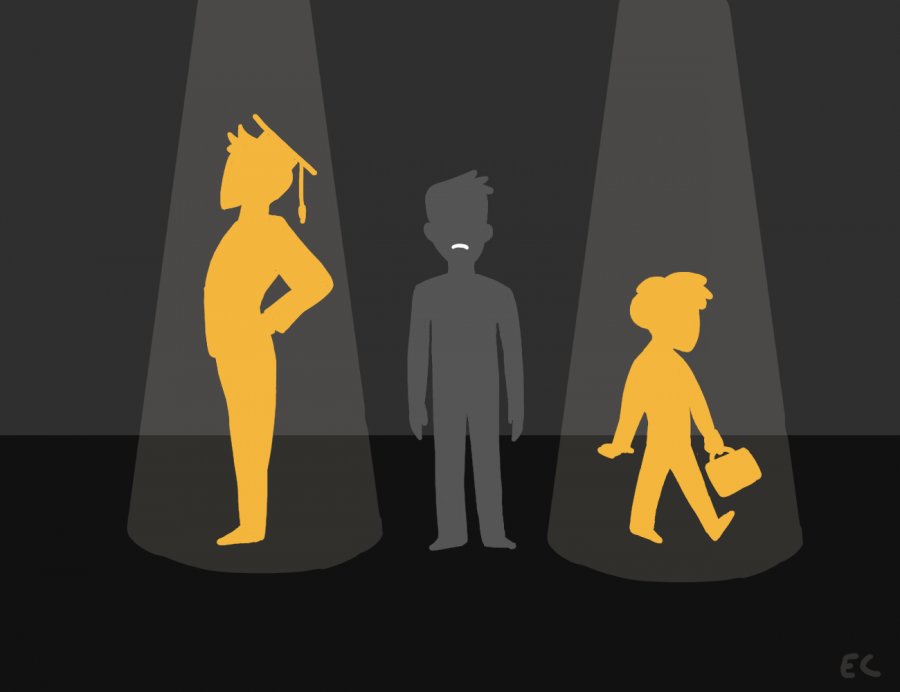Middle Child Syndrome
April 30, 2018
新年快乐. Mandarin. Noun. Definition: Happy New Year. My fingers gripped the cold metal as my hand turned the doorknob. As my arm swung the door outwards, noise suddenly flooded my ear drums. It was not the type of Sunday morning quiet chatter you might hear at a cafe, or the rambunctious yelling at a party, but the sound of overlapping conversations. Individually, each conversation wasn’t loud, but when their harmonies meshed together, the unforgettable sonata of Chinese family gatherings grew comfortable in my ears. It had been a whole year since we last had a family gathering, and most of us had changed quite a bit. Customary to Confucian principles, my brothers and I made rounds to our relatives, greeting each family member with a “Happy New Year” and polite conversation. As we approached my grandma, my brothers and I each waited for our turn to greet her. My older brother was the first. As her arms wrapped around him almost protectively, she stepped back and remarked about how tall he had grown, how responsible he was getting, and how proud she was that he was maturing into a young man. My little brother went next, as she bent down to hug him too, demanding a kiss on her cheek which he reluctantly gave, she observed how cute my little brother was and how precious it was that he was still in his golden child years. As it got to my turn, my grandma hugged me like my brothers but said “Happy New Year” to us all and left to attend to her cooking. A weight sank in my stomach at the clear disparity between my grandma’s comments on my older and younger brother and her comments, or lack thereof, to me. Of course, I quickly got over it because I was frankly used to it.
Growing up, I’ve always been sandwiched between my older brother, the first born, and my younger brother, the baby. My older brother was tall, somewhat responsible, mature, and always achieving the next milestone in his life, approaching closer and closer to adulthood. My younger brother was small, adorable, filled with energy, and despite his age, was always seen as the baby of our family. To my parents, my older brother would always be their first child, and my younger brother would always be their last child. I never really fit in. It may sound cheesy, but I differed from my brothers drastically. My two brothers were always more athletically inclined, louder, and they shared many interests. They enjoyed gaming, were in their school’s band, watched sports, swam, and wanted to pursue business in the future. Meanwhile, I, on the other hand, was always quieter and more studious. I found gaming to be a waste of time, sports to be uninteresting, and wanted to pursue law or political science. From these differences, I had already begun to feel ostracized from my family. I, amongst millions of middle children around the globe, feel left out from the rest of our family. This feeling is coined as ‘Middle Child Syndrome’. While it may sound ridiculous, ‘Middle Child Syndrome’ is a common term many people, regardless of their birth order, know about. Is ‘Middle child syndrome’ simply a feeling of inadequacy or can it be biologically traced to real effects?
According to Business Insider, ‘Middle Child Syndrome’ is in fact, not grounded in science; however, psychologists have noticed similarities amongst middle children that could be a result of birth order. Psychology professor, Dr. Catherine Salmon from the University of Redlands stated that, “In terms of undivided time and attention and effort, middleborns do lose out on that”. This discrepancy in undivided attention from parents is a signal to the rift in independence between siblings. While the first and last born siblings tend to be more reliant on their parents, middleborns show a greater independence from their parents, a common trait associated with ‘Middle Child Syndrome’. Another cause of this feeling of divergence, according to Insider, is birth order. Dr. Frank Sulloway told Insider that, “Once a role is filled by the first born, the second-born will seek out a role that’s completely opposite.” This helps to explain why I, amongst many other middle children, am so different from my siblings. According to Sulloway, this is a psychological response to roles being filled out by firstborns. However, it is important to note that not all middle children feel excluded or relate to any of the traits commonly associated with middle born children. While these traits are statistically common among middle children, these studies cannot encompass the sentiments of all middle children.
While being a middle-child may seem to come with deficits, middle-borns often possess positive innate traits and advantages. 52% of our U.S. Presidents as well as historical icons, such as Bill Gates, Charles Darwin, Susan B. Anthony, Nelson Mandela and Madonna, have been middle children. Their success could be attributed to the fact that middle children are exceptional at getting along with others, making them extraordinary team players and leaders. Middle children are also usually more independent, helping them in the future, where they are forced to fend for themselves. Salmon explained, “As they get older, [middle children] recognize that they were given more space, and it makes them more independent.” Furthermore, according to Psychology Today, middleborns are “not used to getting their way, and so they become savvy, skillful manipulators.”
At the end of the day, my frustrations may not be justified through a real syndrome. However, I can rest assured knowing that I am not completely alone in the disparity between the behaviors and character traits of me versus my brothers. Being the middle born is part of what makes me uniquely me. I may be a middle child awkwardly sandwiched between the beloved first born and spoiled baby, but I wouldn’t have it any other way.

